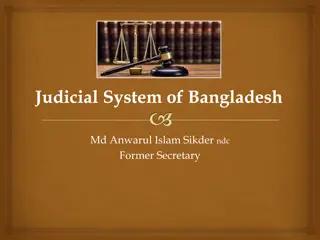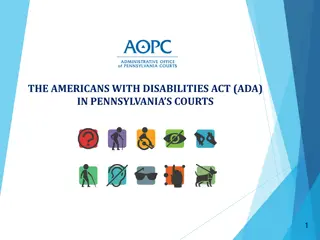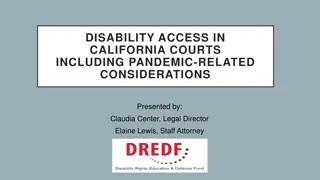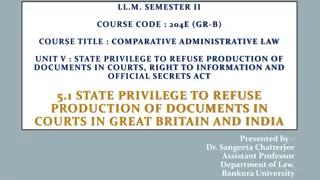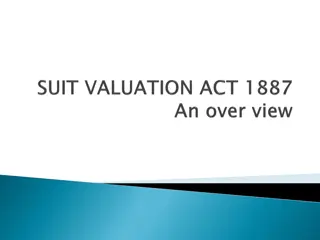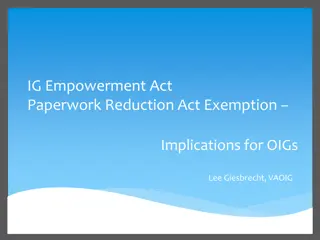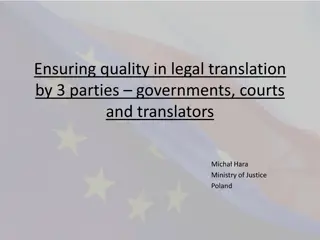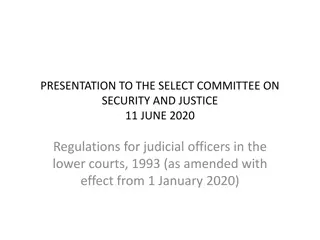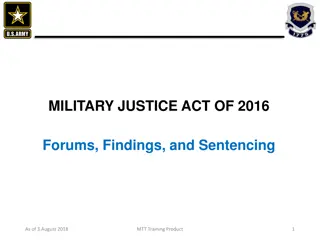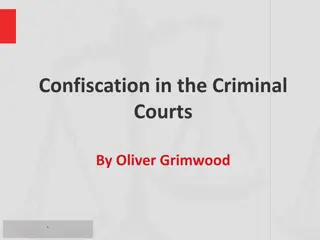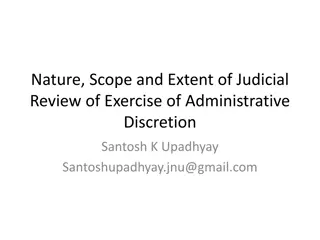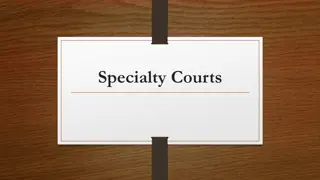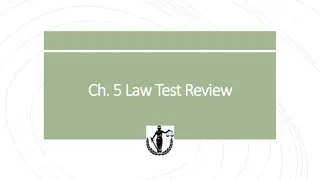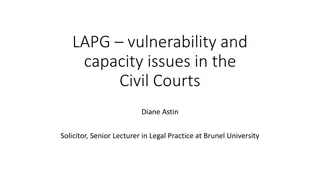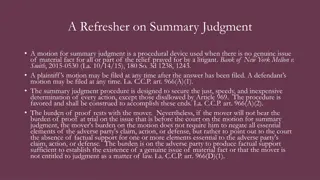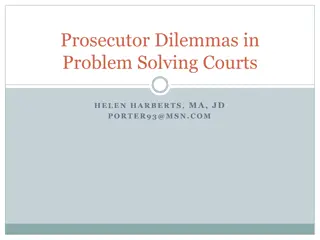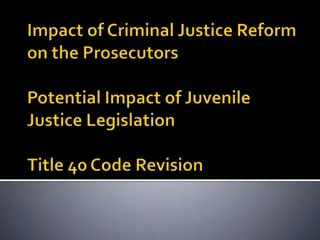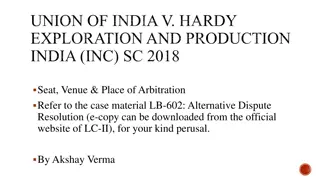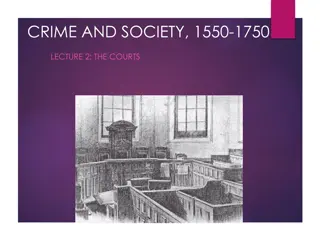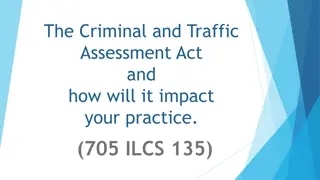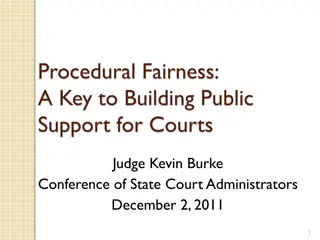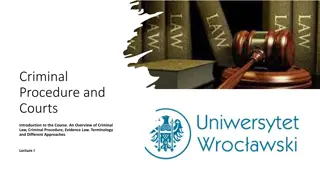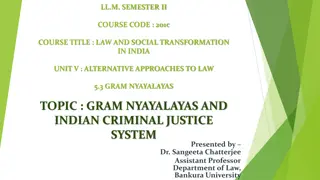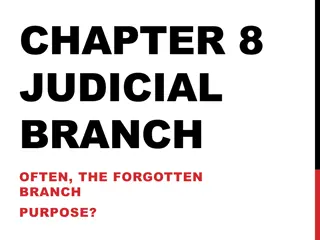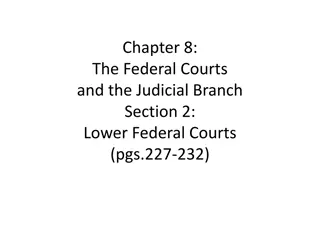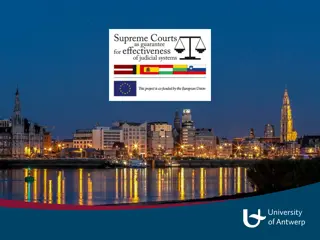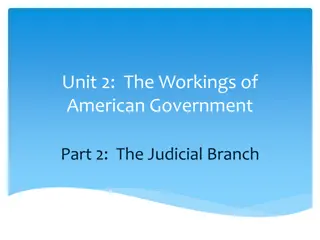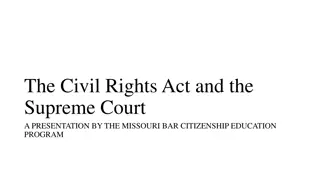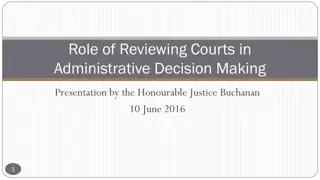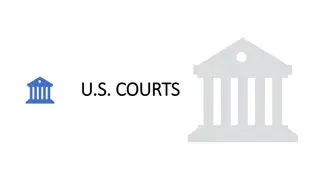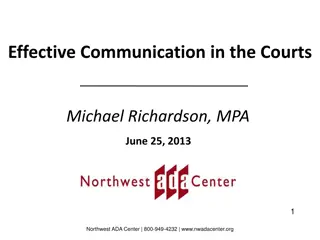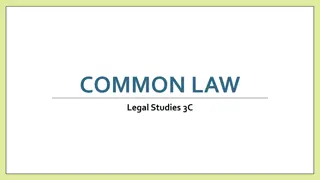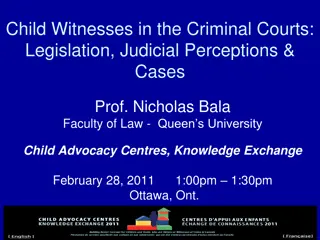Understanding the Judicial System of Bangladesh
The judicial system of Bangladesh is diverse, consisting of the Supreme Court, civil and criminal courts, courts of special jurisdiction, and more. The Constitution plays a vital role, outlining the structure and functions of the courts. From the Supreme Court to subordinate courts and tribunals, th
1 views • 37 slides
JUDICIAL REVIEW OF NATIONAL ACTION BY UNCLOS COURTS AND TRIBUNALS
International judicial review involves oversight by international courts and tribunals over the actions of States Parties in implementing their international commitments. UNCLOS courts exercise supervisory jurisdiction through grounds of review like due regard, reasonableness, necessity, and proport
1 views • 7 slides
THE AMERICANS WITH DISABILITIES ACT (ADA)IN PENNSYLVANIA’S COURTS
Title II of the Americans with Disabilities Act (ADA) ensures that no qualified individual with a disability can be excluded or discriminated against in accessing public entity services, including courts in Pennsylvania. The Unified Judicial System in Pennsylvania has policies and designated ADA Coo
0 views • 37 slides
Understanding the Role of Town and Village Courts in Municipal Governance
Explore the historical significance and impact of Town and Village Courts on municipal boards, focusing on the balance between branches of government, the importance of Justice Courts to constituents, and tips for enhancing relationships between municipalities and justice courts.
0 views • 46 slides
Disability Access in California Courts: Pandemic Considerations and Legal History
This presentation on disability access in California courts, including pandemic-related considerations, covers relevant laws like Title II of the ADA and Section 504, historical developments such as the ADA enactment, and rules ensuring non-discrimination and accessibility in court proceedings. It a
0 views • 30 slides
State Privilege to Refuse Production of Documents in Courts: A Comparative Analysis between Great Britain and India
Doctrine of state privilege allows governments certain privileges, such as the right to refuse production of documents in courts. This privilege is recognized in both Great Britain and India, with specific statutory provisions defining its scope and application. In Great Britain, the Crown's powers
2 views • 12 slides
Understanding Ethics, Confidentiality, and HIPAA in Drug Treatment Courts
Explore the importance of ethics, confidentiality, and HIPAA regulations in drug treatment courts. Learn about the laws such as 42 CFR Part 2 and HIPAA that protect the privacy of patient records. Discover who is covered by these laws and the entities that receive federal assistance. Gain insights i
0 views • 43 slides
Understanding Suits Valuation Act 1887 and Its Purpose
The Suits Valuation Act 1887 serves to determine the jurisdiction of courts by valuing specific suits. Its purpose includes ensuring the proper forum, expediting justice, protecting rights, rectifying jurisdictional issues, and assigning relevant courts to each case. The act distinguishes between va
0 views • 24 slides
Understanding Implications of IG Empowerment Act and Paperwork Reduction Act
The IG Empowerment Act provides beneficial provisions for Inspector Generals (IGs) such as exemptions from certain acts, including the Computer Matching Act and Paperwork Reduction Act. The Paperwork Reduction Act requires federal agencies, including IGs, to obtain OMB clearance before conducting su
1 views • 25 slides
Ensuring Quality in Legal Translation by 3 Parties: Governments, Courts, and Translators
Explore the importance of quality legal translation involving governments, courts, and translators in criminal proceedings. The European Union's Directive on interpretation and translation aims to facilitate communication across Member States. Governments play a key role in regulating the translatio
0 views • 20 slides
Regulations for Judicial Officers in Lower Courts: Presentation to Select Committee
This presentation outlines the regulations governing judicial officers in lower courts, focusing on leave categories, vacation leave provisioning, and the vacation leave cycle. It highlights the historical background, the Magistrates Act of 1993, and the recent amendments effective from January 1, 2
4 views • 26 slides
Overview of Military Justice Act of 2016 and Court-Martial Proceedings
This comprehensive overview covers the Military Justice Act of 2016 and various aspects of court-martial proceedings, including different types of courts-martial, required votes for findings and sentencing, changes in special court-martial procedures, and more. The content delves into the specific c
0 views • 44 slides
Confiscation in the Criminal Courts: A Guide to Proceeds of Crime Law
Confiscation in the criminal courts involves depriving defendants of benefits gained from criminal conduct within their means. The Proceeds of Crime Law in the Cayman Islands sets guidelines for these proceedings, emphasizing that confiscation is not a form of punishment but aims to recover obtained
3 views • 17 slides
Cultural Awareness for Drug Courts Working with Native American Participants
Understanding the cultural nuances of Native American communities is crucial for Drug Courts collaborating with Tribal Healing to Wellness Courts. This involves acknowledging tribal sovereignty, regional and cultural differences, customs, spirituality, and communication styles unique to American Ind
0 views • 22 slides
Understanding Judicial Review of Administrative Discretion
Judicial review of administrative discretion aims to ensure that public authorities act within the bounds of their statutory powers and in the public interest. Courts do not act as appellate bodies but review decisions to ascertain proper consideration of relevant facts and absence of extraneous inf
0 views • 9 slides
Specialty Courts and Recidivism Rates in the United States
Specialty Courts, such as Drug Courts and Problem-Solving Courts, provide intensive behavioral supervision and treatment for substance abuse and mental health issues. These courts aim to reduce recidivism rates and engage criminal offenders in therapeutic interventions. Nevada is actively running 42
1 views • 14 slides
Understanding Jurisdiction and Court Systems: Law Test Review
Explore the concept of jurisdiction in the legal system, from the powers of courts to the different types of courts like admiralty and appellate courts. Learn about the structure of the federal courts in the U.S. and the functions of the Supreme Court. Gain insights into the specialized jurisdiction
2 views • 41 slides
Understanding Vulnerability and Capacity Issues in Civil Courts
Exploring vulnerability and capacity issues in civil courts, this content delves into the importance of addressing vulnerabilities of parties and witnesses for ensuring fair participation and quality evidence in legal proceedings. Topics covered include factors contributing to vulnerability, the rol
0 views • 21 slides
Understanding the Judicial Branch of the Federal Government
The Judicial Branch, as the third branch of the federal government, ensures fair law enforcement and interprets laws through criminal and civil cases. Federal courts were established to address issues of state-based justice disparities. The judiciary system comprises district courts for trials, circ
1 views • 34 slides
Understanding Summary Judgment in Louisiana Courts
Summary judgment is a procedure in Louisiana courts used to resolve legal matters efficiently when there is no genuine issue of material fact. The burden of proof lies with the moving party, who must show the absence of factual support for essential elements of the opposing party's claim. Required d
0 views • 29 slides
Challenges and Innovations in Problem-Solving Courts
Helen Harberts, a skilled MA and JD with expertise in problem-solving courts, delves into the dilemmas faced by prosecutors in these courts. Through in-depth insights and thought-provoking questions, the narrative explores the effectiveness of traditional responses to addiction-based offenses, publi
0 views • 65 slides
Impact of Criminal Justice Reforms on State Courts and Prosecutors
Changes in crime classifications and sentencing laws, along with the emphasis on Accountability Courts, are reshaping the criminal justice landscape in the state. Key changes include alterations to theft, burglary, and controlled substance laws, impacting the workload of state courts and prosecutors
0 views • 20 slides
Arbitration Venue vs. Seat Jurisdiction Issue in Union of India v. Hardy Exploration and Production India (Inc) SC 2018
This case involves a dispute between Hardy Exploration and Production India (Respondent) and the Government of India (Appellant) regarding the arbitration venue and seat. The issue revolves around the jurisdiction of Indian courts in post-award arbitration proceedings when the arbitration agreement
0 views • 17 slides
Virtual Town Hall Monroe County Problem-Solving Courts: Stories and Statistics
Explore the Virtual Town Hall hosted by Viterbo University VOICE Initiative and Monroe County, focusing on Problem-Solving Courts. Learn about the initiatives, perspectives, and impacts of Drug Treatment Court, OWI Treatment Court, and Family Reunification Court. Gain insights from key figures like
0 views • 23 slides
Crime and Society, 1550-1750: Courts and Legal System Overview
The lecture covers the courts and legal system during the period of 1550-1750, focusing on the role of the monarch, Parliament, King's Bench, Court of Common Pleas, Assizes, Old Bailey, and local courts like Quarter Sessions. It highlights the hierarchy and functions of different courts in dealing w
0 views • 19 slides
Understanding the Impact of the Criminal and Traffic Assessment Act
The Criminal and Traffic Assessment Act (705 ILCS 135) impacts legal practice by consolidating fines, defining assessments, creating uniformity, providing sentencing options, and allowing for fee waivers. Financial sentencing components include fines, assessments, service provider costs, restitution
0 views • 40 slides
Understanding Public Perceptions of Courts and Judges
Exploring public opinions on procedural fairness in courts, this content discusses the influence of judges' political views, aspirations for higher courts on their impartiality, and the divided nation on interpreting the Constitution. It also highlights the complexities of public knowledge about the
0 views • 24 slides
Introduction to Criminal Procedure and Courts: Overview and Terminology
This piece provides an introduction to a course on Criminal Procedure and Courts, covering topics such as criminal law, evidence, courts, and international legal bodies. It outlines the exam format, information on lecturers, and essential knowledge needed for the course. Additionally, it shares insi
0 views • 28 slides
Gram Nyayalayas: Enhancing Justice at the Grassroots Level in India
Indian Criminal Justice System has evolved over the years to ensure justice reaches every individual efficiently. The introduction of Gram Nyayalayas represents a significant step towards this goal by establishing formal mobile courts in villages. These courts aim to enhance access to justice and pr
0 views • 16 slides
Understanding the Judicial Branch of the United States
The Judicial Branch, often overlooked, plays a crucial role in interpreting and applying laws fairly. It was established under Article 3 of the Constitution with the dual system separating state and federal courts. The Judiciary Act of 1789 proposed a three-tiered court system, including District Co
0 views • 31 slides
Understanding the Federal Court System in the United States
The Federal Court system in the United States comprises District Courts, handling a vast number of cases each year, with each district having multiple judges. These courts have jurisdiction over a range of cases, including civil rights violations, employment disputes, criminal offenses, and bankrupt
0 views • 11 slides
Role of Supreme Courts in Ensuring Effective Judicial Systems in the European Union
This communication focuses on the vital role of Supreme Courts in guaranteeing the effectiveness of judicial systems within the European Union. It delves into the significance of courts' communication strategies, emphasizing accessibility of justice, trust-building, and public image. The discussion
0 views • 29 slides
Overview of Courts and Legal System in Greece
The legal system in Greece is structured around ordinary and special courts, with judicial power vested in the courts of law. The system includes ordinary civil, criminal, and administrative courts, along with special courts for specific cases. The three jurisdictions - civil, criminal, and administ
0 views • 22 slides
The American Judicial Branch: Structure and Judicial Review
The American judicial system consists of District Courts, Appellate Courts, and the Supreme Court. District Courts handle initial cases, Appellate Courts hear appeals, and the Supreme Court is the highest authority. Justices are nominated by the President and confirmed by the Senate. Judicial review
0 views • 12 slides
The Civil Rights Act of 1964 and the Supreme Court
In the 1960s, Congress passed the Civil Rights Act of 1964, a pivotal legislation that prohibited discrimination in public accommodations. This act represented a significant shift in focus towards minority rights. The Supreme Court's past rulings on the Civil Rights Act of 1875 influenced Congress t
0 views • 24 slides
Role of Reviewing Courts in Administrative Decision Making Presentation
The presentation by the Honourable Justice Buchanan on the role of reviewing courts in administrative decision-making highlights key legal cases and principles. It explores the delicate balance between judicial review and administrative decision-makers' discretion, emphasizing the importance of proc
1 views • 38 slides
Understanding the U.S. Court System: Jurisprudence and Structure
Law enforcement officers play a crucial role in the criminal justice system by understanding criminal jurisprudence and the court system's structure. This includes knowledge of different court levels, jurisdiction, and the adjudication process. The duality of courts, such as adult vs. juvenile court
0 views • 43 slides
Understanding Effective Communication in Courts for People with Disabilities
This material from the Northwest ADA Center provides insights into effective communication practices for individuals with disabilities in state and local courts. It covers the importance of communication, auxiliary aids and services, and action planning for support. The Americans with Disabilities A
0 views • 52 slides
Overview of Legal System in Australia
This content covers various aspects of the legal system in Australia, including common law, sources of law, court hierarchy, appeals process, federal courts, and the importance of judicial independence. It outlines the key components of the legal framework, such as the role of Parliament, judge-made
0 views • 36 slides
Child Witnesses in Criminal Courts: Legislation & Judicial Perceptions
Prof. Nicholas Bala discussed legislation and judicial perceptions regarding child witnesses in the criminal courts, focusing on Bill C-2 amendments, competency inquiries, the Canada Evidence Act, and survey findings on child competency. The presentation highlighted changes in the legal framework to
0 views • 38 slides
